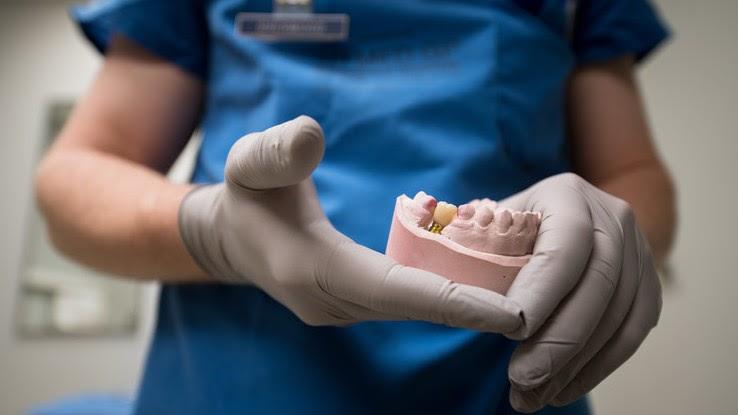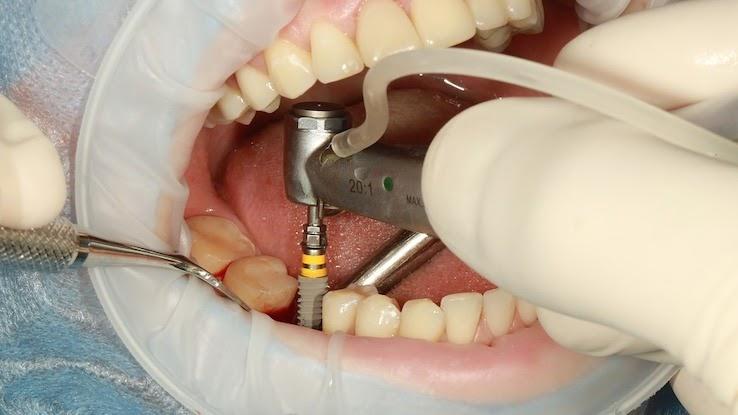
Periodontal disease, injury and decay are some of the most common reasons that seniors lose their teeth. One alternative that seniors can use to restore their smiles is dental implants.
A dental implant consists of a foundation that attaches your new tooth (the implant) to the bone beneath your gums.
Attaching the implant in this way adheres it to your jawbone, making the implant a permanent fixture of your smile. Here’s what seniors should know about the benefits and procedures associated with dental implants.
Advantages of Dental Implants
Dental implants offer multiple physical and mental advantages for seniors who have lost one or more of their natural teeth and are uncomfortable with their current smiles. A dental implant is the closest thing you can get to a natural tooth. This is due to the structure of the implant.

The implant rests on a foundation that ultimately fuses to your own jawbone. The foundation that attaches the implant to your jawbone is known as an abutment. This abutment connects your new ceramic tooth, known as a crown, to your mouth.
The process during which the abutment attaches to your jawbone can take a few weeks. In the meantime, your dentist can place a temporary tooth. Once the abutment fuses with your jawbone, your dentist can attach your new tooth. Because the new ceramic tooth is affixed to your jaw, it’s as sturdy as your own natural teeth.
An implant even feels and functions like a natural tooth. Your implant won’t come loose when you eat. Even sticky snacks won’t move your implant from its abutment. You also don’t have to worry about removing and cleaning your implant like you have to do with false teeth such as dentures. Dental implants are much less of a hassle than their removable alternatives.
Many patients feel self-conscious about their missing teeth. Dental implants can give you a smile that you’re proud to show off and restore your self-confidence. Because implants are permanent, you’ll have the security of knowing you always have a beautiful smile that’s ready to display. Missing teeth can sometimes cause speech issues. Replacing the missing teeth with implants can make it easier for you to speak properly.
With thorough care, dental implants can last a lifetime. Once they’re in place, they require little maintenance other than normal tasks like brushing, flossing and routine cleanings.
Another big benefit of dental implants is that they can improve your overall dental health. You don’t have to remove any of your healthy teeth for your dentist to place an implant. In time, missing teeth can cause your other teeth to shift. Implants keep your other teeth in place. Your dentist can place your implants with appropriate spacing so that it’s easy for you to floss and clean between the implant and your surrounding teeth.
Who’s a Good Candidate for Dental Implants?
Certain seniors are better candidates for dental implants. The ideal candidate for dental implants has enough healthy jawbone for the implants to adhere to. A healthy jawbone is necessary for the proper attachment of the abutment.

If you’re lacking enough healthy jawbone, this doesn’t mean you have to write off dental implants entirely. Instead, you’ll need to discuss with your dentist whether you’re a candidate for bone grafting. This increases the amount of jawbone you have so there’s enough healthy bone for the implants.
If you only need a small amount of additional jawbone, your dentist can do a small bone graft when placing your implants. More extensive bone grafting requires an additional procedure. You might need to wait a few months for the jawbone to heal before proceeding with installing implants.
Seniors should not have any medical problems that inhibit their bodies’ healing process. They should also be willing to devote a few months to all the procedures required for dental implants.
How to Prepare for Dental Implants
There are a few things seniors can do to prepare for their dental implants. If you currently smoke, vape or use other tobacco products, you should discontinue their use a few months before you receive the abutments for your dental implants. Smoking makes it difficult for your body to heal itself and increases the likelihood that your dental implants may fail to adhere to your jawbone properly.

Some medications can increase your risk of infection. Make sure to disclose any prescription medications that you take to your dentist. You may need to take antibiotics prior to your first procedure to minimize your risk of infection.





